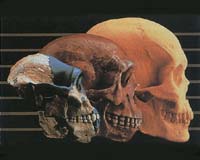| Title: |
Homo sapiens, cultural evolution and computing - a perspective. |
| Speakers: |
George Mallen |
| Date: |
20th Jan 2011 |
| Time: |
14.30 Room open in advance (from 14.00) – meet up with society members. |
| Location: |
Fellows Library of the Science Museum, Exhibition Road, London, SW7 2DD |
|
 |
About the seminar
This talk will explore the externalisation of human knowledge and how the growth of computing and digital networks has changed and advanced our personal, social and cultural behaviours.
The 8 million year long haul from ape to homo sapiens is now well understood as an evolutionary process. However the most recent bit of this long haul, roughly from quarter a million years ago to now, which has seen the dramatic emergence of our culture with music, language, tool making and co-operative social strategies, is perhaps more mysterious than the biological evolution which laid its foundations. Cognitive processes, not biological ones, have largely shaped that period and brought us to where we are now. Language and tool making have been the critical developments and these are capabilities which enable us to externalise inner thoughts and make them available to others. Our collective scientific knowledge is possibly the most impressive product of that externalisation but now with the emergence of computing and digital networks our personal, social and cultural behaviours are also being externalised.
The talk will explore the grounds for this externalisation narrative and speculate about what it might imply for our future.
About the speaker
George Mallen has had a long involvement in cross cultural aspects of computing. From early work in the Maths Department at the Royal Aircraft Establishment in the early 60s he moved to the interdisciplinary world of cybernetics with Gordon Pask's System Research organisation. After that, in 1970, his interests branched. He was a founder member of the Computer Arts Society, he co-founded the software company System Simulation Ltd and also took up a part time Research Fellowship at the Royal College of Art where he helped introduce computing as a taught subject..
Since then his work has been a superposition of these interests but with his main recent emphasis on the development and running of System Simulation Ltd. The company celebrates its 40th anniversary this year and is well established as one of the main providers of software infrastructure for major cultural heritage institutions such as museums, galleries and image libraries.
Background
Follows an earlier talk to the Computer Arts Society.
Click  to see a podcast of the event
to see a podcast of the event
|
|
|
|
